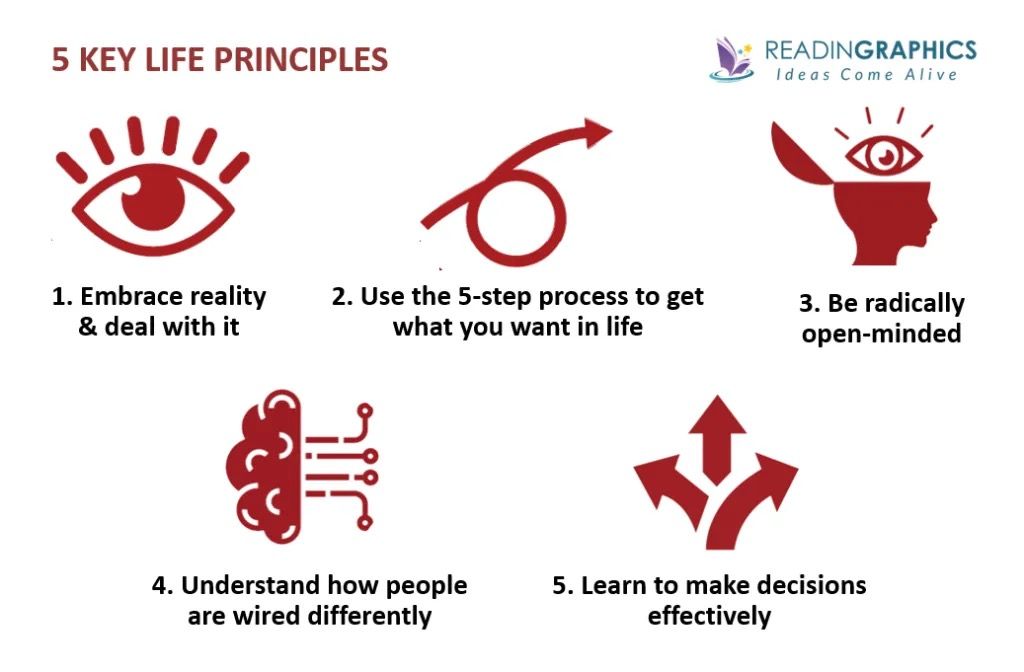Principles by Ray Dalio Summary
This book gives the roadmap for productive and fulfilling relationships in life and work.

Principles by Ray Dalio gives the roadmap for productive and fulfilling group relationships for work, family, and friends. This summary is split into two parts. Part 1 is about individual group members and how they can develop the correct values. Part 2 is about group culture and principles.
Part 1: Group Members
Get the right values:
1. Accept reality and deal with it
- Dreams + reality + determination = a successful life.
- Delusional idealists = problems + unsuccessful life
- Radical truthfulness and transparency: always tell the truth and be open.
- Success comes from suffering.
- Asking people who are strong in areas where you are weak is a great skill you need to develop.
- Set goals, create processes to reach those goals, find bottlenecks that stop you from achieving the goals, remove bottlenecks (fix problems), reach goal.
- Open mindedness (be humble and listen to people more successful than you) + personal accountability = success
2. Use the 5 Step Process for Success
The 5 step Process:
- Have clear, audacious goals. Read them every day.
- Identify problems keeping you from your goals
- Diagnose the root causes of your problems (accurately analyze yourself or have other people analyze you).
- Design a plan before you act (develop a system/habits)
- Execute to completion (act)
- Each step requires multiple innate qualities and nobody has all of them, so you have to get help to discover weaknesses and fix them or team up with people who are strong where you are weak.
3. Be radically open-minded
- Mental models + humility (ask for help/be open minded) = success
- Get mental models from studying Farnam Street blog and Charlie Munger.
- Ego and blind spots are what keep intelligent, hard working people from success.
- Asking smart people the right questions is as important as having all the answers.
How to be open minded:
- Make being open minded a habit.
- Record (write down and log) your decisions. This will allow you to discover patterns where you consistently fail.
- Ask people close to you to help find gaps in your knowledge or decision making.
- Don’t make big decisions without consulting other (successful/knowledgeable) people first.
- Meditate
4. Understand That People are Wired Very Differently
- If you want to know what is true and what to do about it, you must understand your own brain.
- Study psychology, psychiatry, neuroscientists, personality testers.
- Do a personality test — Myers Briggs test.
- This can help you see your objective strengths and weaknesses
- You can develop your personality. Ex) an ISTJ can develop more ENFP qualities.
5. Learn how to Make Decisions Effectively
- In general, choose “great” over “new”. Ex) watch a known great classic movie instead of a new movie.
- Approximations are very valuable. Education system makes you be too precise, which is unnecessary for many things and sometimes detrimental.
- If someone says, “not always” they are bringing up an exception to the rule. It’s better to focus on the rules rather than get hung up on every exception.
- Try to stay above-the-line when speaking or writing. Going below-the-line will easily get convoluted and you could lose your audience.
- Above-the-line = big picture
- Below-the-line = smaller details
- Study logic and rationality to get better at decision making.
- Distill available options down to their most simple but still accurate form to make the comparison easier.

Part 2: Group Relationship Principles
Create the right culture:
1. Idea meritocracy — don’t let the other people or yourself live in delusions. Always tell the truth and how you really feel/think.
- Idea Meritocracy = Radical Truth + Radical Transparency + Believability-Weighted Decision Making.
- Believability = expert = knowledgeable = history of success in that area
- It’s not realistic to strictly say nobody can ever lie. You need to weigh the severity of the lie (stealing a piece of cake vs committing a felony).
2. Cultivate meaningful relationships and meaningful work (common purpose/mission).
- All groups should feel like a family — work, friends, relationships, etc.
- Regularly have group activities, events, and trips that the group does together.
- Be considerate — let others do what they want as long as it doesn’t negatively effect you or others.
3. Make it a cultural norm to learn from mistakes.
- Everyone has mistakes, no need to hide them. But you have to track/log them and learn from them.
- You should look back on yourself from a year ago and think: “I can’t believe how stupid I was.” This shows growth.
- What kind of mistakes are acceptable? Ethics vs competence. Ethical mistakes (Ex. breaking the law) are unacceptable but competence mistakes may or may not be acceptable.
4. Getting on the same page (communication)
- There are 2 main ways communication can go wrong: cases resulting from simple misunderstandings and those stemming from fundamental disagreements. Getting on the same page is the process of open-mindedly and assertively rectifying both types.
- Don’t gloss over major or minor differences to keep the peace. Major differences kept under the table lead to big problems. Minor differences not addressed compound into major differences.
- Values cannot be changed — need to find people with similar values.
5. The most knowledgeable/expert/successful person on a subject will make the decision — regardless of seniority.
- They must be able to clearly articulate their idea so that everyone can understand it and they should have a history of success in the subject.
- Reasoning is like singing. It doesn’t take long to figure out who can do it — regardless of age or experience.
- Everyone needs to state their confidence level on their inputs. A suggestion is not as highly weighted as a strong conviction.
- Figure out if you should be a teacher, student, or peer in a discussion. Ie) Should you be explaining, listening, or debating.
- Don’t have opinions about things you haven’t researched extensively.
6. Have an agreed resolution process (for disagreements).
- Disputes are rarely resolved to both parties’ equal satisfaction.Imagine you are having an argument with your neighbor about a tree of theirs that has fallen onto your property. Who is responsible for its removal? Who owns the firewood? Who pays for the damage? While you might not be able to resolve the disagreement yourselves, the legal system has procedures and guidelines that allow it to determine what’s true and what to do about it, and once it renders its judgment it’s done, even if one of you didn’t get what you wanted. That’s just the way life is.
- Have group members vote on what idea/resolution they think is best.



Comments ()